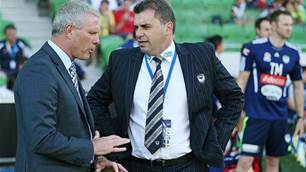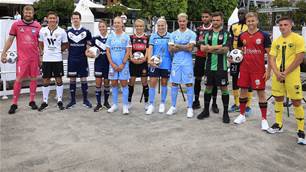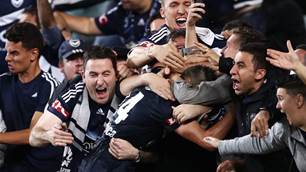EXCLUSIVE:: Ex-German World Cup coach Jurgen Klinsmann has opened the inaugural FFA Coaches Conference this morning with encouraging words for Australia’s future.
In front of a crowd of around 300 at Sydney’s State Sports Centre, which included Sydney FC coach John Kosmina and retiring A-League star Ritchie Alagich, the German great noted the progress the game has made in this country in his keynote speech.
“I don’t know your culture and roots well so I can’t offer too much advice but you have made very big progress over the last couple of years,” he said via video link from California.
“Obviously with a successful World Cup run but also the fact that the A-League is in place right now.
“So the development goes down to grassroots level with initiatives and the fact that I don’t know how many Australian players play in big European leagues.
“That is a stamp for quality. It’s a long road, but I think you are on the right [track].”
Klinsmann played in Australia 10 years ago at the opening of the Olympic Stadium at Homebush and coached against the Socceroos in 2005 when Germany beat Australia 4-3 in the Confederations Cup.
The coach also gave the conference an insight into his preparations ahead of the 2006 World Cup, where Germany finished third and won many friends with their high-paced, entertaining approach.
“For any nation it’s important to be hungry and ambitious, and that’s what Germany has always been," he said.
“For me, preparing the side for a World Cup on German soil, I wanted to work with people who were the best in their various fields, be it in physiotherapy staff, assistant coaching staff, conditioning staff, sports psychologists and empower them to give me their best.
“These people knew more in their field than I did so it was important to give them confidence and show they were empowered.
“As for the tactical approach, when we sat down well before the World Cup, we wanted a style that suited our nation and our cultural background. We like a high intensity game that is physical, so that’s what we did.
“So once we’d identified the style we wanted to play, we tailored all our preparations towards that – the type of training, the physical preparations, it was all tailored towards that way of play.”
The new manager of Bayern Munch also revealed that team bonding was important to Germany’s success. That included bringing in the families of all the players before the World Cup in order to make their camp feel more like a big family.
“So the players felt they could rely on their teammates too. It also gave us an opportunity to see if certain players did not share that opinion and if we should continue to go with them.
“Team building is the base of everything, be it one on one, in groups or whatever,” Klinsmann added. “Chemistry is everything.”
the former Spurs and Inter Milan striker revealed his thoughts on what makes a good coach.
“A coach has to be a leader of his staff and his team,” he said.
“He has to create a clear environment of identity in how he wants his team to play. And be a good communicator and to pass on respect so you can empower your staff.”
Klinsmann’s theme of cultural specificity ran through many of his ideas. When quizzed on the differences between the leagues in Europe, he said: “In Italy, it’s all about the result. So if you win 1-0 the fans are happy, but maybe in England they boo you [for not entertaining].
“In the English leagues, the atmosphere of the crowds drives on the players and they play at such a high speed.
"In France, though, with their roots in African football, it is quite technical as many of these players are skilful, but maybe it’s not as fast paced as other leagues.”
“I don’t know your culture and roots well so I can’t offer too much advice but you have made very big progress over the last couple of years,” he said via video link from California.
“Obviously with a successful World Cup run but also the fact that the A-League is in place right now.
“So the development goes down to grassroots level with initiatives and the fact that I don’t know how many Australian players play in big European leagues.
“That is a stamp for quality. It’s a long road, but I think you are on the right [track].”
Klinsmann played in Australia 10 years ago at the opening of the Olympic Stadium at Homebush and coached against the Socceroos in 2005 when Germany beat Australia 4-3 in the Confederations Cup.
The coach also gave the conference an insight into his preparations ahead of the 2006 World Cup, where Germany finished third and won many friends with their high-paced, entertaining approach.
“For any nation it’s important to be hungry and ambitious, and that’s what Germany has always been," he said.
“For me, preparing the side for a World Cup on German soil, I wanted to work with people who were the best in their various fields, be it in physiotherapy staff, assistant coaching staff, conditioning staff, sports psychologists and empower them to give me their best.
“These people knew more in their field than I did so it was important to give them confidence and show they were empowered.
“As for the tactical approach, when we sat down well before the World Cup, we wanted a style that suited our nation and our cultural background. We like a high intensity game that is physical, so that’s what we did.
“So once we’d identified the style we wanted to play, we tailored all our preparations towards that – the type of training, the physical preparations, it was all tailored towards that way of play.”
The new manager of Bayern Munch also revealed that team bonding was important to Germany’s success. That included bringing in the families of all the players before the World Cup in order to make their camp feel more like a big family.
“So the players felt they could rely on their teammates too. It also gave us an opportunity to see if certain players did not share that opinion and if we should continue to go with them.
“Team building is the base of everything, be it one on one, in groups or whatever,” Klinsmann added. “Chemistry is everything.”
the former Spurs and Inter Milan striker revealed his thoughts on what makes a good coach.
“A coach has to be a leader of his staff and his team,” he said.
“He has to create a clear environment of identity in how he wants his team to play. And be a good communicator and to pass on respect so you can empower your staff.”
Klinsmann’s theme of cultural specificity ran through many of his ideas. When quizzed on the differences between the leagues in Europe, he said: “In Italy, it’s all about the result. So if you win 1-0 the fans are happy, but maybe in England they boo you [for not entertaining].
“In the English leagues, the atmosphere of the crowds drives on the players and they play at such a high speed.
"In France, though, with their roots in African football, it is quite technical as many of these players are skilful, but maybe it’s not as fast paced as other leagues.”
Related Articles

Kiwi legend: A-League can seize the day post-COVID-19

Backlash over Fox Sports new season launch













